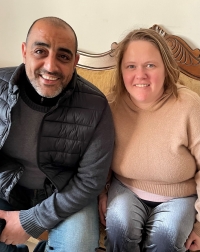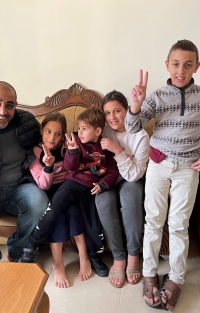news article
My occupied life
February 6, 2023 / By Heather Ann
Editor's Note: On January 31, we published an article about the relationship that Dianne Roe, Upper New York Taskforce for Palestine-Israel member, developed with a Palestinian family Click here to read that article. Below, the mother of the family, an American, writes about her life in Al-Ezariya, Palestine.
My name is Heather Ann; I was born and raised in Cincinnati, Ohio, USA. I am 36 years old, and I graduated with an Associate’s Degree in Liberal Arts and Sciences from Xavier University in my hometown in 2013 and completed a Bachelor’s Degree of Arts in Psychology with a minor in Sociology from the University of Cincinnati in 2016. Going to college was a transformative experience for me. My parents had never gone to college, and I never really had an interest in my education when I was growing up because I was dealing with a challenging childhood. In contrast, my life was stable when I went to college, and I flourished as a student.
I am currently a stay-at-home mom to two daughters and two sons in the isolated village of Al-Ezariya in Palestine. My daughters are Tasnim, who is 12 years old, and Retal, who is eight. My son Kareem is 11, and Zinedine (Zine) is four. I met my Palestinian husband in Cincinnati, and we got married in 2010. My husband and I decided to move to the Palestinian Territories, where his family lives, following the birth of our youngest son.
On my way to Palestine, at the Allenby Border/Checkpoint in Jordan, I was detained and interrogated for three hours by three female Israel Defense Forces (IDF) soldiers and one older IDF male lieutenant before they permitted me to cross the border. They demanded to know if I had a relative in Palestine outside of my husband’s family. Unbeknownst to me, I had lost my civil rights, civil liberties, and freedoms as soon as I crossed the border, receiving a single black stamp in my passport stating that I must report back to Allenby Checkpoint in exactly one month. Instead, I remained here illegally for four and a half more years because my husband desired to live and raise our four children here in Palestine, and I was unable to get a Palestinian ID card. I remained torturously sequestered in my home like a prisoner too afraid to go anywhere. Even venturing outside the Palestinian village of Al-Ezariya felt simply out of the question, due to my sheer fear that I could be caught by IDF soldiers at a checkpoint, discovered to be living here illegally and deported back to the United States. I finally received my Palestinian citizenship card in February 2022.
My day-to-day life in Al-Ezariya is in some ways typical of many mothers living back home in America, but unfortunately in many aspects, it is not. A typical day for me involves waking up at 6 a.m. to wake my children up and get them ready for school. They leave for school around 7 a.m.; I sit, have a cup of coffee and feed breakfast to my youngest son Zinedine, who is not in school yet. After I finish my coffee, I start cleaning my house while listening to a podcast. School is only half a day here; so my children usually get home at 12:30 pm. I feed them lunch; then they go to their rooms to do their homework while I put their little brother down for an afternoon nap. He does not like to sleep alone; so by the time we wake up an hour or two later, my older children have their homework finished. Then they play games on their phones and iPad. Like their American counterparts, they love to play Minecraft and Roblox online with each other and their cousins who live upstairs.
Al-Ezariya is a rather large densely populated village, now isolated from East Jerusalem and other Palestinian cities by Israel’s Wall and checkpoints, but it wasn’t always this way. Al-Ezariya acted as a crossroads during the time of Jesus. Al-Ezariya was, and still is to a lesser extent, one of the world’s most prominent hubs of tourism with thousands of people visiting here every year. My husband remembers when his home was within walking distance from Jerusalem, and his father used to take him to Jerusalem to pray at Al Aqsa mosque. He also used to work at a restaurant in Jerusalem when he was in school.
The co-editor-in-chief of the Middle East Journal Fenjan, Leila Shadid, writes, “Once a thriving suburb of Jerusalem, Al-Eizariya enjoyed a more stable economy and easy access to the city until 2002, when the Israeli government began construction of the so-called ‘separation wall,’ known to many as the ‘apartheid wall,’ and subsequently cut off Al-Eizariya from its livelihood.” It is a rapidly growing metropolis as more Palestinian people and businesses move into the village, but economic opportunities are still very limited. Palestinians living in Al-Azyria can no longer travel to Jerusalem without a special permit, work there, or even sell things to Palestinian-owned businesses in Jerusalem.
An Israeli human rights organization, B’Tselem, reports that by 2009, 650 of 1135 hectares of Al-Ezariya’s land had been confiscated by the Israeli government for building Ma’ale Adummim, a Jewish settlement, which left no room for this Palestinian village to expand horizontally. In addition land has been confiscated for the building of the Wall and bypass roads connecting Israeli settlements. This loss of land to Israel has caused Al-Ezariya to become increasingly overcrowded. Homes are built on top of one another, leaving no space for an actual yard around your home. Construction of new homes and people adding to existing structures is constant.
The management of solid waste is a prevalent issue in Al-Ezariya, as it is in the rest of the Palestinian Territories, leading many to burn their trash and dump municipal waste at random dumping sites. Safa Dhaher, an assistant professor at Birzeit University, writes that In the case of Al-Ezariya, there is the additional obstacle of Palestinians not having political or military control over most of their land base, which was designated to be under Israel’s complete control during the Oslo Peace process. Therefore, only Israel can issue a license for a public landfill, which it hasn’t done. Israel also does not commit any funds for infrastructure in our village.
There was one instance where I had no choice but to venture outside of Al Azyria despite my illegal status. In late August 2021, I found out I was five weeks pregnant. I proceeded to schedule an appointment with my obstetrician, who has a clinic in Al-Ezariya, for my sixth-week ultrasound to determine the viability of the pregnancy because I have a medical history of miscarriages. My husband and I went to the appointment–there was no heartbeat. My obstetrician said it might be too early and requested that I come back in a week. When I returned, she said that I was still measuring small for my gestational age, no heartbeat was detected, and to come back into the office again a week later. When I returned to the office, there was still no heartbeat. I was diagnosed with a blighted ovum since the pregnancy was not progressing. Because I was in the eighth week of pregnancy, I would have to undergo a medical abortion. She told me that I would have to go to Al-Makassed Hospital, which is over the Wall and in Jerusalem, to have the procedure. We were both devastated and dumbfounded; there was no way I could get to Jerusalem without citizenship and identification.
Facing the impossibility of going to Al Makassed Hospital for a medical abortion, my sister-in-law contacted her gynecologist in Ramallah, which is one of the larger Palestinian cities in Palestine, and scheduled my appointment for the medical abortion. My appointment was scheduled for September 19, 2021 at 8 am. My husband had to rent a car specifically with tinted windows so no one could see inside the car and abided by the traffic laws to prevent us from being stopped at an IDF checkpoint and to prevent us from being pulled over by the police. Luckily, I was able to get the procedure without any further complications.
I worry about my children’s safety and overall well-being, and the situation here is deteriorating by the day. There is a profound lack of safe greenspaces and parks where children can play, and there are no after-school programs and no school /community youth sports leagues or athletic clubs. Every other day and night teargas is thrown over the Wall by the IDF, causing the people in the village pain and difficulty breathing.
The IDF claims that they are stopping Palestinian teenagers from throwing rocks at the Israeli soldiers who are entering our village, but I don’t think the protesting teenagers are only reason. I theorize that the IDF throws teargas into our village to compound the misery of Palestinian life. The dispersing of teargas used to only occur around the Islamic holidays as people filled the streets purchasing gifts and goods to celebrate during the month of Ramadan, during Eid feasts, and perhaps once a month. Now with rising tensions, the dispersing of teargas, flash bombs, and teargas bombs have become a daily and nightly occurrence. The IDF also implements other strategies, including routinely shutting off the water and electricity, to make life miserable for everyone living here in Al Ezariya.
As the tensions between the IDF and Palestinians have been escalating throughout the past few months, the IDF has begun dousing our village in a noxious substance that could only be described as skunk water, which smells of pure septic tank runoff whose odor lasts for days on end and penetrates through your skin, hair, clothes and fills your home, even with the windows closed. With the mounting unrest, schools and businesses are regularly shutting down for their own safety.
Palestinians are also protesting for better pay and working conditions and honoring the dead. Recently three men from my small city were shot and killed by IDF forces. Two were teenagers: Fayez Damdoum, 18, and Uday al-Tamimi, 17. The third victim was a 49-year-old man, Barakat Odeh, who was shot and killed in Jericho.
Now I realize that when I received my Palestinian identification card, it was more like a Palestinian inmate number and I have continued to be imprisoned by Israel’s military occupation. Although now I’m not afraid of being deported because I don’t have the right document, I am afraid of being detained or shot by an Israeli soldier at any time. I am even more afraid of one of my children being detained or shot by an Israeli soldier. I still need another permit from the Israeli government if I want to go to Jerusalem, which is only about a mile from our house. Whenever the IDF disperses tear gas or skunk water, the only place I have to escape to is my house, and the poison still penetrates our rooms. I find myself dwelling on my past, when I felt more free.
References
“El Eizariya (including Al Ka’abina) Town Profile.” Applied Research Institute, Jerusalem, 2012, http://vprofile.arij.org/jerusalem/pdfs/vprofile/El Eizariya_EN.pdf.
Shadid, Leila. “The Story of Al-Eizariya: Jerusalem’s Town Forgotten Behind the Wall.” The New Arab, 10 Nov. 2022, https://www.newarab.com/features/story-al-eizariya-town-forgotten-behind-wall.
Shalev, Nir. “The Hidden Agenda: The Establishment and Expansion Plans of Ma’ale Adummim and their Human Rights Ramifications.” BIMCOM (Planners for Planning Rights) and B’Tselem (The Israeli Center for Human Rights in the Occupied Territories), December 2009, https://www.btselem.org/download/200912_maale_adummim_eng.pdf.